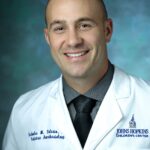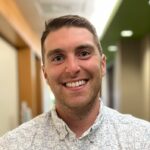2024 Levi Symposium Participants
Shira Abeles, MD - Associate Clinical Professor of Medicine, Division of Infectious Diseases and Global Public Health, University of California San Diego

Shira Abeles, MD is an Infectious Diseases physician and Associate Clinical Professor of Medicine at the University of California San Diego (UCSD). She graduated from Princeton University with a degree in Ecology and Evolutionary Biology, and earned her medical degree from Columbia University College of Physicians and Surgeons. She completed her medicine residency and infectious diseases fellowship at UCSD. She has been UCSD Health’s Medical Director of Antimicrobial Stewardship since 2016, Associate Medical Program Director of Infection Prevention and Clinical Epidemiology since 2020, and Medical Director of Sustainability since 2022.
Matthew Aubourg, MSPH - Research Associate, Department of Environmental Health and Engineering, Johns Hopkins Bloomberg School of Public Health

Matthew A. Aubourg, MSPH is a Research Associate in the Department of Environmental Health and Engineering at the Johns Hopkins Bloomberg School of Public Health. He works alongside community-based organizations to co-create community-driven research addressing environmental health and justice issues, translating research to action. He serves in the Community Science and Innovation for Environmental Justice (CSI EJ) Initiative and the National Institute of Environmental Health Sciences (NIEHS) P30 Center for Community Health: Addressing Regional Maryland Environmental Determinants of Disease (CHARMED) Community Engagement Core.
Moriah Barr - Sustainability Project Manager, Johns Hopkins Health System

As the Sustainability Project Manager for Johns Hopkins Health System, Moriah aims to advance sustainability within the healthcare field. Through collaborative work within the Facilities Department and across the Johns Hopkins system, she has led various initiatives to protect the natural system without compromising patient care. She has experience in project management through her background as an environmental consultant, as a United Nations Millennium Development Fellow, and through the sustainability institute of her alma mater. She graduated from Furman University with a B.S. in Sustainability Sciences and is currently pursuing a M.S. in Environmental Sciences and Policy at JHU.
Deanna Benner, WHNP - Women's Health NP, Co-Chair of ChristianaCare's Environmental Sustainability Caregiver Committee

Deanna Benner is a Women’s Health Nurse Practitioner at ChristianaCare where she has worked for the past 17 years. Deanna is the Co-Chair of ChristianaCare’s Environmental Sustainability Caregiver Committee where she promotes sustainability initiatives to improve the environmental impact of healthcare delivery. Deanna’s passion is to continue to educate staff and patients on how our health is connected to the way we interact with our environment. She earned her BSN at Villanova University, and her MSN from the University of Pennsylvania.
Jenny Blumenthal-Barby, PhD, MA - Cullen Professor of Medical Ethics and Associate Director of the Center for Medical Ethics and Health Policy at Baylor College of Medicine

Jenny Blumenthal-Barby, Ph.D., M.A. is the Cullen Professor of Medical Ethics and Associate Director of the Center for Medical Ethics and Health Policy at Baylor College of Medicine. Dr. Blumenthal-Barby is a philosopher bioethicist whose research focuses primarily on decision-making and ethics.
Dr. Blumenthal-Barby has been the recipient of a Greenwall Faculty Scholar Award in Bioethics, a Pfizer Bioethics Fellowship, and has served as the Principal Investigator on four awards from the Patient Centered Outcomes Research Institute (PCORI) to study and improve decision making in advanced heart failure. Recently, she received funding as a Co-Principal Investigator to study ethics and decision making in pediatric deep brain stimulation through the NIH BRAIN initiative. She has also received funding as Principal Investigator from AHRQ to study the utilization of an AI/machine learning system that predicts personalized risks using big data. She has published more than 130 articles in bioethics, philosophy, and medical journals as well as served on several expert panels and committees related to bioethics and medical decision making. She is an Associate Editor for the Journal of Medical Ethics and The American Journal of Bioethics where she also serves on the Editorial Board. Dr. Blumenthal-Barby was an elected member of the Board of Directors for the American Society for Bioethics and Humanities (ASBH). She has a book out with MIT Press: Good Ethics and Bad Choices: The Relevance of Behavioral Economics for Medical Ethics. In 2023 she was elected a Hastings Center Fellow.
Sarah Bucic, MSN, RN - Policy Analyst, Alliance of Nurses for Healthy Environments

Sarah Bucic, MSN, RN, PMHCNS-BC (she/her) is a Policy Analyst with the Alliance of Nurses for Healthy Environments (ANHE). In her work at ANHE, Sarah focuses on outreach to current administrative officials and legislators around ANHE’s climate policy initiatives and identifies opportunities for nurse engagement in regulations and policymaking. Sarah has been a RN since 2001 and has taught undergraduate nursing students both in the classroom and in the community. She holds a Master’s in Psychiatric Mental Health Nursing from the University of Pennsylvania and a Post Master’s from University of Maryland in Community/Public Health Nursing.
Robert Chase - Founder and CEO, NewGen Surgical, Inc.

Rob Chase is the founder and president of NewGen Surgical, a pioneering company in sustainably designed, single-use medical devices. With over 25 years of experience in the medical device industry, Rob is committed to integrating sustainable design principles into healthcare, aiming to reduce the sector’s environmental footprint. Under his leadership, NewGen Surgical is transforming single-use surgical products to minimize plastic waste, supporting a shift in the healthcare supply chain toward a circular, eco-conscious model. Rob holds a master’s degree in strategic leadership and a sustainability certificate from Dominican University of California.
Peylina Chu - Senior Vice President, Antea Group and Executive Director, Healthcare Plastics Recycling Council

Peylina Chu is a master at helping companies manage the multiple business aspects of ESG and EHS, from materiality, to stakeholder engagement, to strategic investment for business value and positive impact. With her 20+ years of experience, she understands that in addition to traditional regulatory drivers, today’s companies must meet public and customer expectations, investor concerns and non-governmental organization demands. Peylina leads the Healthcare Plastics Recycling Council (www.HPRC.org), a private technical consortium of more than 30 brand-leading and globally recognized companies collectively representing greater than $1.2 trillion in market value across the manufacturing, healthcare, and recycling industries seeking to improve the recyclability of plastic products and packaging used within healthcare.
Nick Dalesio, MD - Associate Professor; Director of Clinical Operations for Pediatric Anesthesiology, John Hopkins University School of Medicine

I am an Associate Professor of Anesthesiology and Critical Care medicine as well as Otolaryngology/Head and Neck Surgery at the Johns Hopkins University School of Medicine. I am a board-certified pediatric anesthesiologist with current leadership roles including the Director of the Pediatric Difficult Airway Response Team (pDART) and Clinical Operations Director of Pediatric Anesthesiology. I am leading environmental sustainability efforts within the peri-operative area, with projects to reduce green-house gas emissions via removal and limited use of volatile anesthetics, implementing re-usable in favor of disposable equipment, and recycling.
Raychel Gadson, MA - Political Science PhD Student, Johns Hopkins University

Raychel Gadson is a PhD student in the Department of Political Science at Johns Hopkins University studying American Politics and Law and Politics. She is a graduate fellow of the Sustainable Design Practicum, the Center for Medical Humanities and Social Medicine, and the “Rethinking the Right to the City through the Black Radical Tradition” Sawyer Seminar. She received her M.A. in African and African-American Studies from the University of Kansas, and a B.A. in Mass Communications from Kansas State University. Working at the intersection of urban politics, public health and Black feminist thought, her research focuses on Black placemaking in urban environments. Raychel explores the ways that historically segregated Black neighborhoods imagine urban livability, and leverage political knowledge and tools to create environments that meet the needs of residents – specifically Black women. This necessitates engaging with questions regarding environmental justice, housing justice, health equity and the right to the city, the answers to which, she believes, can and must be located in the politics and organizing of Black communities
Ursula Gately - Medical Student at Johns Hopkins School of Medicine

Ursula is a first-year medical student at Johns Hopkins School of Medicine, with a B.S. in Biology of Global Health from Georgetown University. As the former Community Building and Engagement Coordinator for Planetary Health Alliance, she led a successful mentorship program for over 70 students across 30 countries, fostering the growth of youth leaders in Planetary Health. With experience ranging from advocating for migrant farmworker health/well-being to collaborating with community health organizations from Chicago to Virginia, Ursula is dedicated to addressing the intersection of Planetary Health and clinical practice.
Jeremy Greene, MD, PhD - Professor, Department of the History of Medicine, Johns Hopkins University

Jeremy A. Greene, MD, PhD is William H. Welch Professor of Medicine and History of Medicine at Johns Hopkins School of Medicine, where he serves as Director of the Institute of the History of Medicine and founding Director of the Center for Medical Humanities & Social Medicine. In addition to his primary appointments, he serves as faculty and investigator in a variety of capacities at Hopkins.
Dr. Greene’s research explores the ways in which medical technologies influence our understandings of what it means to be sick or healthy, normal or abnormal, on personal, regional, and global scales. He has published The Doctor Who Wasn’t There: Technology, History, and the Limits of Telehealth (University of Chicago Press, 2022); Generic: The Unbranding of Modern Medicine (Johns Hopkins University Press, 2014); and Prescribing by Numbers: Drugs and the Definition of Disease (Johns Hopkins University Press, 2007). His newest research project, Syringe Tide: Disposable Technologies and the Making of Medical Waste, focuses on the shift towards disposable technologies in hospitals and clinics, with inevitable environmental consequences.
He received his MA in medical anthropology (Harvard, 2004) and the MD and the PhD degree in the history of science (Harvard, 2005). He completed his residency in Internal Medicine at the Brigham & Women’s Hospital in 2008 and practices medicine at the East Baltimore Medical Center, a community health center affiliated with Johns Hopkins. His work has been recognized by numerous awards, most recently a 2023-24 Guggenheim Fellowship and the 2021 Nicholas Davies Award from the American College of Physicians for “outstanding scholarly activities in history, literature, philosophy, and ethics and contributions to humanism in medicine.”
Chris Hanley, MBA - Director, Grand Climate Challenge, National Academy of Medicine

Chris Hanley, MBA, serves as the Director of the National Academy of Medicine’s (NAM) Grand Challenge on Climate Change, Human Health, and Equity. One of three academies in the United States, NAM launched this Climate Grand Challenge ) is a multi-year global initiative to improve and protect human health, well-being, and equity by working to transform systems that both contribute to and are impacted by climate change. Prior to joining NAM, he worked at the Association of American Medical Colleges for eight years, most recently serving as the director of a newly formed leadership consortium comprising of Medical School leadership for over 170 medical schools in the U.S.
Jeremiah Headen - US Climate and Health Campaigner, Health Care Without Harm

Jeremiah is a project management professional with extensive experience working with grassroots organizations centered on advancing racial equity and social justice. As the US Climate and Health Campaigner, Jeremiah co-leads the development and implementation of the organization’s place-based work. Before joining Health Care Without Harm, he was program manager at Rockwood Leadership Institute, where he shepherded fellowships focused on supporting the leadership of a network of BIPOC philanthropy staffers, filmmakers, executive directors, and other nonprofit leaders.
Melanie Alfonzo Horowitz - Medical Student, Johns Hopkins University

Melanie is a medical student at Johns Hopkins School of Medicine currently on a research fellowship in the neurosurgery department. Inspired by her undergraduate work in environmental studies, she hopes to bring sustainability into the operating room workflow.
Jeffrey Kahn, PhD, MPH - Andreas C. Dracopoulos Director, Johns Hopkins Berman Institute of Bioethics

Jeffrey Kahn, PhD, MPH, is the Andreas C. Dracopoulos Director of the Johns Hopkins Berman Institute of Bioethics, a position he assumed in July 2016. Since 2011, he has been the inaugural Robert Henry Levi and Ryda Hecht Levi Professor of Bioethics and Public Policy. He is also Professor in the Dept. of Health Policy and Management of the Johns Hopkins Bloomberg School of Public Health. He works across a variety of areas of bioethics, exploring the intersection of ethics and health/science policy, including human and animal research ethics, public health, and ethical issues in emerging biomedical technologies.
Prof. Kahn has served on numerous state and federal advisory panels. He is currently chair of National Academies of Sciences, Engineering, and Medicine’s Board on Health Sciences Policy, and a member of the National Academy of Medicine Council, and previously chaired its committee on the Use of Chimpanzees in Biomedical and Behavioral Research (2011); the committee on Ethics Principles and Guidelines for Health Standards for Long Duration and Exploration Spaceflights (2014); and committee on the Ethical, Social, and Policy Considerations of Mitochondrial Replacement Techniques (2016). He also formerly served as a member of the National Institutes of Health (NIH) Recombinant DNA Advisory Committee.
In addition to committee leadership and membership, Prof. Kahn is an elected member of the National Academy of Medicine and an elected Fellow of The Hastings Center. He was also the founding president of the Association of Bioethics Program Directors, an office he held from 2006-2010.
Prof. Kahn has published four books and over 130 scholarly and research articles. He speaks widely across the U.S. and around the world on a range of bioethics topics, in addition to frequent media outreach. From 1998-2002 he wrote the bi-weekly column Ethics Matters on CNN.com. Prior to joining the faculty at Johns Hopkins, Prof. Kahn was Director of the Center for Bioethics at the University of Minnesota.
Christopher Lemon, MD - Faculty Co-Director for Clinical Programs at the Johns Hopkins Institute for Planetary Health

Christopher Lemon is a practicing emergency physician and Faculty Co-Director for Clinical Programs at the Johns Hopkins Institute for Planetary Health, where he spearheads transformative efforts to integrate Planetary Health principles across clinical education and practice. His work centers on empowering clinical communities to recognize and expand their role in addressing complex planetary health challenges, fostering collaboration beyond healthcare to drive solutions that span disciplines. Christopher also serves on the National Academy of Medicine’s Action Collaborative on Decarbonizing the U.S. Health Sector and the Johns Hopkins Sustainability Leadership Council, bringing a frontline perspective from his experience as an emergency doctor. He is also a fellow with the Bloomberg American Health Initiative’s Environmental Challenges Section, where he continues his advocacy for sustainable, resilient healthcare systems.
Anne Kveim Lie, MD, PhD - Professor, Department of Community Medicine and Global Health, University of Oslo

Anne Kveim Lie is a professor of medical history at the University of Oslo’s Department of Community Medicine and Global Health. Trained as a physician and historian, her research has focused on the history of infectious diseases, pharmaceuticals, and antibiotic resistance, exploring how medical standards and policies evolve over time, particularly within the context of the Scandinavian welfare states. Dr. Lie has an interdisciplinary approach, integrating insights from anthropology, sociology, and clinical practice into her historical research. Her recent interests include the history of disposability in health care and environmental aspects of healthcare practices.
Rexford Manankil - Major Account Manager, Stericycle

Rex Manankil has worked in the Healthcare and Commercial industries for 17 years. His expertise is in Sales and Account Management with medical devices and supplies, distribution, document destruction, and regulated medical waste services.
Peter Mangesho, PhD - Principal Research Officer, National institute for Medical Research- Amani Medical Research Centre

Dr Peter E. Mangesho is a Social Anthropologist with over 19 years of research experience working with NIMR working on assessing the social and cultural aspects of health and illnesses, having researched and published on HIV/AIDS, Tuberculosis, Ebola, COVID-19, Malaria, and clinical trials participation experiences. His research has also looked at the social, cultural and policy aspects of zoonotic diseases, antimicrobial use and resistance (AMR), in a One Health framework. His research and academic interests have expanded into on antibiotic circulation, use and regulation in relation to antibiotic resistance in Africa. In the current project he is studying the historical contribution of global funded health programs and clinical research to single-use medical devices in Tanzania. Through his ethnographic and collaborative research, Dr Mangesho’s work contributes to critical global health issues, especially in Africa, by focusing on understanding local perspectives and needs.
Lisa Maragakis, MD, MPH - Professor, Department of Medicine, Johns Hopkins University School of Medicine

Lisa Maragakis, MD, MPH, FSHEA, FIDSA, is a professor of medicine, infectious disease, and epidemiology at the Johns Hopkins University School of Medicine and the Johns Hopkins Bloomberg School of Public Health. She is the Senior Director of Infection Prevention for The Johns Hopkins Health System. Her research interests are the epidemiology, prevention and control of healthcare-acquired infections and antimicrobial-resistant pathogens. She served as Incident Commander for Johns Hopkins Medicine’s COVID-19 response.
Dr. Maragakis served as the Infectious Disease Society of America Co-Chair for the 2022 Update of the Compendium of Strategies to Prevent Healthcare-Associated Infections and as the Co-Chair of the Centers for Disease Control and Prevention’s Healthcare Infection Control Practices Advisory Committee (HICPAC), a federal advisory committee that provides advice and guidance to HHS and CDC on infection control practices. She currently serves as the Vice President of the Society for Healthcare Epidemiology of America.
Debra Mathews, PhD, MA - Berman Institute Associate Director for Research and Programs and Professor (School of Medicine, Dept. of Genetic Medicine), Johns Hopkins University

Debra JH Mathews, PhD, MA, is the Associate Director for Research and Programs for the Johns Hopkins Berman Institute of Bioethics, and a Professor in the Department of Genetic Medicine, Johns Hopkins University School of Medicine. Dr. Mathews also runs the Genomics and Society Mentorship Program and serves as the Chair of the Berman Institute’s Inclusion, Diversity, Anti-Racism, and Equity (IDARE) Committee. Within the Institute for Assured Autonomy (IAA), Dr. Mathews serves as the Ethics & Governance Lead. In this role, she leads work focused on the ethical, societal, and governance implications of autonomous systems, and identifies opportunities across IAA for the integration of ethics and governance work and priorities.
Dr. Mathews’s academic work focuses on ethics and policy issues raised by emerging technologies, with particular focus on genetics, stem cell science, neuroscience, synthetic biology, and artificial intelligence. Dr. Mathews is a member of the steering committee of The Hinxton Group, an international collective of scientists, ethicists, policymakers and others, interested in ethical and well-regulated science, and whose work focuses primarily on stem cell research. She has been an active member of the International Neuroethics Society since 2006, has been on the Society’s Board of Directors since 2015, and is currently serving as President of the Society. In addition to her academic work, Dr. Mathews has spent time at the Genetics and Public Policy Center, the US Department of Health and Human Services, the Presidential Commission for the Study of Bioethical Issues, and the National Academy of Medicine working in various capacities on science policy.
Brianne McCormick - Healthcare Specialist, Stericycle

I have been with Stericycle for over 10 years and in that time I have managed the waste streams at multiple Maryland hospitals. I engage with multiple departments within the hospital systems to help reduce waste, operate in a more sustainable manner and provide ongoing education with the clinical staff for proper waste segregation and disposal processes.
Emmie Mediate, MA - U.S. Chief Program Officer, Health Care Without Harm

As the U.S. Chief Program Officer, Emmie leads Health Care Without Harm and Practice Greenhealth in developing strategies to engage the health care sector in addressing climate change and promote health and equity.
Prior to joining Health Care Without Harm, Emmie oversaw COVID-19 response and recovery as the Regional Coordinator for Mid-Atlantic Region III at the CDC Foundation. She also previously served as the Chief of Staff at the American Flood Coalition, a nonpartisan group of mayors and city officials driving resilience to rising seas and more frequent flooding. Emmie has worked as the Director of Presidential Affairs at the Planned Parenthood Federation of America and as an International Development Fellow on a USAID-funded project in Uganda. She was formerly a Special Assistant at the Baltimore City Health Department and a health policy fellow in the Office of Senator Michael Bennet (D-CO).
Emmie graduated from the University of Notre Dame with a B.A. in Health Studies and Africana Studies. She also holds two master’s degrees from the University of Oxford, where she studied as a Rhodes Scholar. Emmie lives in Hampton, Virginia with her wife.
Maria Merritt - Professor, Berman Institute of Bioethics and Bloomberg School of Public Health (Department of International Health, Health Systems Program), Johns Hopkins University

My home discipline is philosophy and I mainly work on the ethics of international public health research and practice. My current research interests include: — Social justice in health-related policy decision making, with special attention to health care equity and climate justice in de-carbonizing health systems — How academic research institutions can best partner with communities to align the scientific agenda with community members’ own vision of a healthy life, specifically in the context of epidemiological research on infectious diseases sensitive to climate change — Nurturing the capacity for wonder in educational settings for health professionals.
Ligia Paina, PhD - Assistant Professor, Department of International Health, Johns Hopkins Bloomberg School of Public Health

I am a mixed methods researcher with over a decade of experience in health systems research and evaluation, focusing on disparities in healthcare. My multi-disciplinary training in international studies and public health, informs my work in implementation research, health policy analysis, and evaluation. My contributions include reducing disparities in maternal health care and enhancing access to care for vulnerable urban populations. I teach courses on the application of systems thinking to public health and prospective policy analysis in health, aiming to build capacity of course participants to design research and practice which informs decisions in real-time and prospectively, in partnership with policy and practice actors. I seek to contribute to climate mitigation efforts in health, specifically those which address disparities and environmental injustices. I am interested in the incentives that health care support industries have and the unintended, positive and negative impacts of these on communities that are already managing multiple and overlapping disparities and dimensions of environmental injustice, and how to support health systems to do better.
Greg Sawtell - Zero Waste Just Transition Director, South Baltimore Community Land Trust

Greg Sawtell is the Zero Waste Just Transition Director with the South Baltimore Community Land Trust. He has worked on environmental justice campaigns since 2012 in Baltimore beginning with the successful effort to stop the nation’s largest trash incineration from being built less than a mile from schools in South Baltimore. Greg coordinated the development of Baltimore’s community led Zero Waste Plan and is currently focused on implementation in coalition with labor, community, and government. Greg is a graduate of the Rhode Island School of Design and the University of Maryland School of Social Work.
Deborah Schwengel, MD, MED - Associate Professor of Anesthesiology, Critical Care Medicine, and Pediatrics, Johns Hopkins School of Medicine

Deborah Schwengel is a pediatric anesthesiologist with experience as an education leader and innovator and is involved with projects in educational innovation, disaster preparedness, and sustainability in the operating room environment.
Hardeep Singh, MD, MPH - Professor and Co-Chief, Health Policy, Quality and Informatics Program, Center for Innovations in Quality, Effectiveness and Safety Michael E. DeBakey VA Medical Center and Baylor College of Medicine, Houston

Hardeep Singh, MD MPH is a Professor of Medicine at the Center for Innovations in Quality, Effectiveness and Safety (IQuESt) based at the Michael E. DeBakey Veterans Affairs (VA) Medical Center and Baylor College of Medicine, Houston. He leads a portfolio of multidisciplinary quality and safety research focused on measuring and reducing diagnostic errors in health care, improving the use of health information technology, and transforming health care systems. His research has informed several national and international patient safety initiatives and policy reports, including those by the National Academy of Medicine (NAM), National Quality Forum, CDC, OECD, and the WHO. He serves as a nominated member of the NAM Board of Health Care Services and is an elected Fellow of the American College of Medical Informatics for significant and sustained contributions to the field of biomedical informatics.
Singh represents the VA on the NAM Climate Collaborative and the Federal Health Systems Learning Network for Climate Action. He also serves on the executive committee of The Lancet Commission on Sustainable Healthcare and co-leads their Environmental Performance and Quality Measures working group. He has received several prestigious awards for his pioneering work in quality, safety, and health system transformation, including the AcademyHealth Alice S. Hersh New Investigator Award in 2012, the Presidential Early Career Award for Scientists and Engineers (PECASE) from President Obama in 2014, the VA Health System Impact Award in 2016, and the 2021 John M. Eisenberg Patient Safety and Quality Award for Individual Lifetime Achievement.
Prabhjeet Singh, MSPH - Project Manager, MedStar Health

Prabhjeet Singh is a project manager and public health consultant with developing experience in health systems, health economics, and health finance & management. He is a trained clinician adept at strategizing innovative solutions for different problems in healthcare systems and life sciences. He is committed to improving health equity and outcomes both domestically as well as globally.
Khoudia Sow, MD, PhD - Dr, Regional Centre Training and Research, CRCF

Dr. Khoudia Sow, medical doctor in public health with a PHD in health anthropology is a researcher at the CRCF (Centre Régional de Recherche et de Formation à la prise en charge de Fann, Dakar, Senegal). She has dual expertise in health anthropology and public health. For more than 20 years, she has collaborated or directed research into social and health aspects of HIV infection, before moving on to investigate other health issues: reproductive health, social protection, addictions and emerging epidemics such as Ebola and Covid: Ebola, Covid. She is currently coordinating several research projects at the CRCF on the vulnerability of key populations to HIV, epidemic preparedness, social effects and vaccination of covid.
Alice Street, PhD - Professor of Anthropology and Health, University of Edinburgh

Dr Alice Street is Professor of Anthropology and Health at the University of Edinburgh and specialises in the development and deployment of medical technologies for under-resourced settings. Her current research focuses on the environmental and social impacts of plastic waste from single-use medical devices, and the value assumptions that drive wastefulness in global health. She also explores the emergence of alternative, more sustainable and equitable global health innovation systems.
Julie Sze, PhD - Professor, American Studies, UC Davis

Julie Sze is a Professor of American Studies at UC Davis. She is also the founding director of the Environmental Justice Project at UC Davis. Sze’s research investigates environmental justice and environmental inequality; culture and environment; race, gender and power; and urban/community health and activism. Professor Sze has published 3 sole authored books, edited a collection, and written over 70 journal articles and book chapters primarily in the fields of environmental studies and the environmental humanities, geography, and public policy.
Margaret (Meg) Tharp - Medical Student, Indiana University School of Medicine; Master of Public Health Graduate Student, Johns Hopkins Bloomberg School of Public Health

Meg Tharp is a rising 4th year medical student at Indiana University School of Medicine and a current Master of Public Health Graduate Student at the Johns Hopkins Bloomberg School of Public Health. At the Bloomberg School, she is concentrating in Global Environmental Sustainability and Health. She has been involved in healthcare sustainability research and advocacy efforts in her home state of Indiana and currently serves on the Editorial Board of EyeSustain, an international organization dedicated to exploring sustainability solutions in ophthalmology and beyond. Meg plans to keep healthcare sustainability and environmental justice-related efforts as a focal point in her career, and will be applying to ophthalmology residency programs upon returning to medical school.
Cecília Tomori, PhD, MA - Associate Professor and Assistant Director of the DNP Executive/MPH Dual Degree Program, Johns Hopkins School of Nursing

Cecília Tomori is Associate Professor and Assistant Director of the DNP Executive/MPH Dual Degree Program, and holds a joint appointment at the Bloomberg School of Public Health’s Department of Population, Family and Reproductive Health. Dr. Tomori is internationally recognized for her expertise on breastfeeding, infant sleep, and maternal child health. Her research has contributed to the understanding of breastfeeding, human infant behavior and parental care in a cross-cultural and evolutionary context. Additionally, Dr. Tomori’s work has combined anthropological and public health approaches to investigate how historical, cultural and structural forces have undermined breastfeeding and contributed to persistent health inequities. Her recent work focuses on creating enabling, equitable environments for breastfeeding globally and on addressing the structural, social, and commercial determinants of health. As part of this work, Dr. Tomori has explored the harmful influence of the commercial milk formula industry in shaping infant feeding decisions and undermining breastfeeding, and advocates for policy solutions that limit this influence. Furthermore, Dr. Tomori has analyzed and proposed policy approaches that scale up structural support and strengthen regulations that protect, promote and support breastfeeding to improve first food security in the context of rising global threats from pandemics, climate change, conflict and inequality.
Antonio J. Trujillo, PhD - Professor, Johns Hopkins Bloomberg School of Public Health

Antonio Trujillo, PhD, MPP, is a health economist working to improve access to medicines and the lives of seniors with chronic conditions around the globe. He is an Associate Professor in the Department of International Health with expertise in health economics, applied econometrics, and behavioral economics.
His main areas of interest include
– Systems design to identify individuals with high-risk factors for chronic conditions such as hypertension and diabetes
– The use of economic incentives to motivate individuals with chronic conditions to engage in self-management
– The role of clinical guidelines in reducing medical costs to treat chronic conditions
– The causal links between chronic conditions and labor force participation, informal care, and income
He has studied the role of intrinsic and extrinsic motivation on preventive behavior of patients with chronic conditions. His goal is to incorporate individual information on personality in the design of public health programs to increase treatment adherence among individuals with diabetes and hypertension. Currently, Antonio is exploring how an economic view of fairness can inform drug regulation. He is also evaluating health systems policies to increase access to generic drugs and biosimilars.
Antonio is the director of the Master of Health Science (MHS) in Global Health Economics degree program in the Department of International Health. He teaches an advanced econometrics course on program impact evaluation using observational data and a course on behavioral economics and public health.
Enrico Vona - Vice President, Stericycle Inc.

Enrico Vona has worked with the healthcare industry for over 20 years. Enrico’s expertise lies in the areas of healthcare waste characterization, proper segregation, and compliant transport and disposal practices, including comprehensive training for hospital staff members and development of programs for disposal of all healthcare waste materials focused on regulatory compliance and environmental sustainability.
Enrico has held various roles with Stericycle, including managing a large nationwide team that provides program management for all healthcare waste streams, including operational and vendor management, hospital staff training, operational efficiency programs and environmental sustainability programs. Enrico’s team members have expertise pertaining to regulatory compliance and they utilize proprietary portable technology to drive compliant and sustainable waste disposal and optimal segregation to assure compliance and reduce hospitals’ environmental impact through reduced landfilling of waste and other efficiencies. Enrico’s team utilizes a continuous improvement paradigm in order to drive attainment of our clients’ goals with a focus on partnering with multiple stakeholders and departments within healthcare facilities.
Seema Wadhwa - Executive Director, Environmental Stewardship, Kaiser Permanente

Seema Wadhwa is the Executive Director of Environmental Stewardship for Kaiser Permanente. Her environmental stewardship work includes collaborating across a wide set of functions including facilities, purchasing, finance, community health, physician groups, and more. Seema represents KP externally in coalitions, policy arenas, and other critical forums. Seema works to continue KP’s leadership across healthcare and evolve efforts to support communities to create equitable and inclusive action for environment and health.
Prior to her time at KP, Seema worked as the Assistant Vice President of Sustainability and Wellness for Inova Health System in Virginia. During that time, she developed the organizational framework for sustainable operations that included energy, water, waste management, sustainable foods, alternative transportation and environmentally preferable purchasing. She put in place key data and system tools, along with establishing the governance and organizational structures, policy recommendations and goals to hardwire climate and health into the organization. She also served as a national director for the Healthier Hospital Initiatives, a coalition of 1,300 hospitals across the US to accelerate the adoption of sustainable and climate smart scalable solutions. She most recently founded her own consultancy, Net Positive Solutions, working with mission driven and non-profit organizations across the country advising on strategies for sustainability. She has spoken, written and published extensively on environmental and sustainability issues, including co-authored the first book for leadership in the field of healthcare sustainability. She has a degree in Civil Engineering from the University of Alberta and hails from the great country of Canada, where she grew up. Seema started her career building roads and neighborhoods and now works to create healthier and more equitable communities.
Ryan Weeks, PhD - Sr. Sustainability Specialist, Green Labs & Zero Waste; Office of Climate & Sustainability, Johns Hopkins University

Ryan Weeks works to make all research labs at Johns Hopkins more sustainable through individual behavioral changes and institution-wide initiatives. Ryan holds a B.A. from Colby College and completed a Ph.D. in Chemical Biology at Johns Hopkins. His work with sustainability began during his PhD research when he helped begin the JHU Green Labs program and has since expanded his efforts to support JHU on its commitment towards achieving Zero Waste.
Peter Winch, MD, MPH - Professor, Department of International Health, Johns Hopkins Bloomberg School of Public Health

Prof. Peter Winch is Professor in the Social and Behavioral Interventions (SBI) Program in the Department of International Health, Johns Hopkins Bloomberg School of Public Health. He has been teaching since 1988, has served as academic advisor for over 300 graduate students, and teaches courses on global health, qualitative and formative research, design of facility and community-based behavior change interventions, and applied medical anthropology. The main focus of my work is community engagement in health, behavior change interventions, and qualitative and formative research, with current projects in Bangladesh, DR Congo, Guinea and Mali. Since 2019 he has served as co-chair of the Johns Hopkins Sustainability Leadership Council.
Jonathan Zenilman, MD - Professor, Infectious Diseases Division, Johns Hopkins University

Jonathan Zenilman has been on faculty for 35 years and is formerly chief of the infectious diseases division at JH Bayview. His areas of interest are in sexually transmitted infections, vaccine preventable diseases , public health policy and general infectious diseases.








































